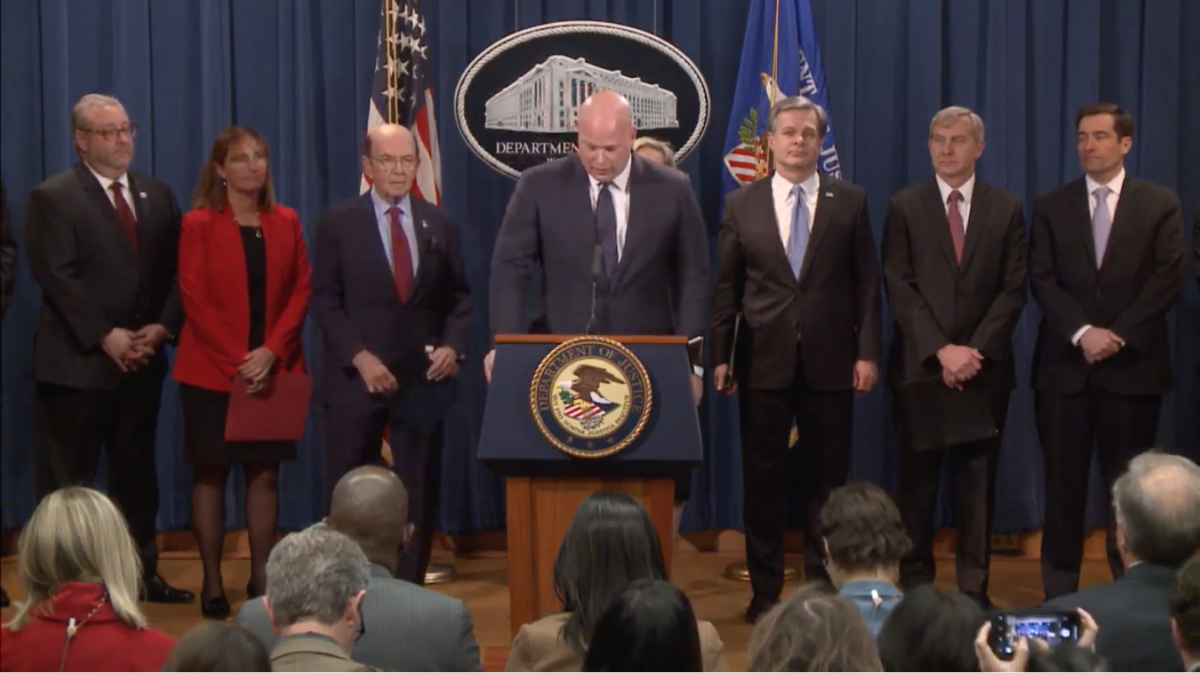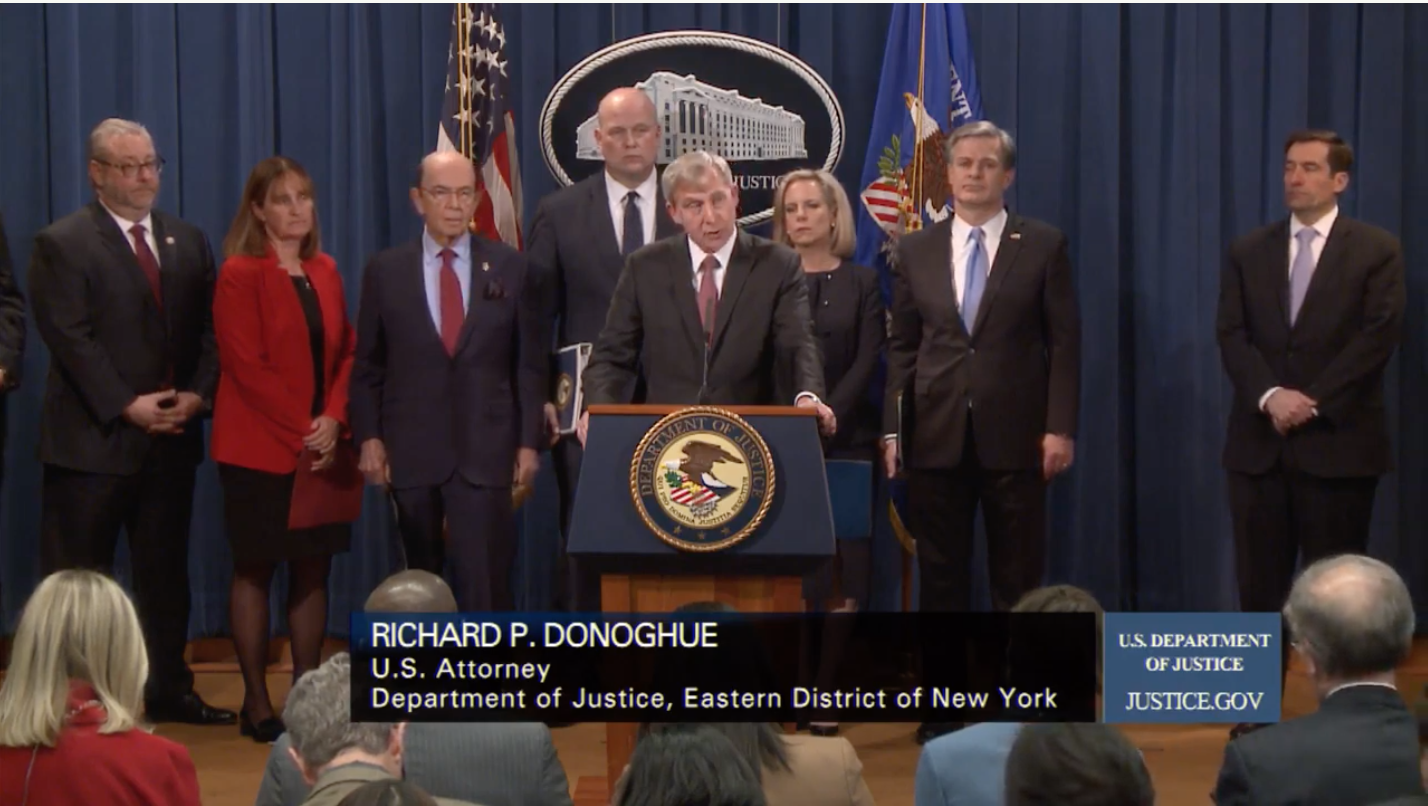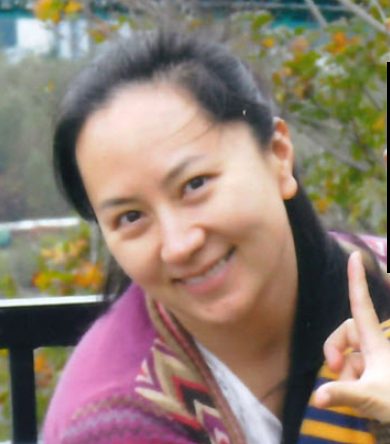
Bob Mackin
Two days after Canada’s ambassador to China was fired for saying it would be “great” if the United States dropped its case against Meng Wanzhou, top officials in Washington, D.C. announced they would pursue the Huawei chief financial officer’s extradition.
In a Jan. 28 news conference, acting attorney general Matthew Whitaker and heads of the FBI, Department of Homeland Security and Department of Commerce revealed 10 charges that were filed Jan. 16 against Chinese telecom giant Huawei in Seattle and 13 charges filed Jan. 24 in Brooklyn, N.Y.
The latter case centres on the Hong Kong-incorporated Skycom, which the U.S. says functioned as Huawei’s Iran-based subsidiary in order to get around trade sanctions. The other 10 charges accuse Huawei of stealing trade secrets about T-Mobile’s Tappy mobile phone testing robot.

U.S. officials annouce charges against Huawei CFO Meng Wanzhou (DoJ)
Meng, who was arrested on a U.S. warrant at Vancouver International Airport on Dec. 1, is one of three people charged in the Brooklyn filing. Names of the other two defendants are censored because they have not been arrested.
Meng was released on $10 million bail and curfew conditions Dec. 11. She returned to B.C. Supreme Court on Jan. 29 to reorganize her sureties and to set March 6 as the next date. Canada’s justice ministry has received the official extradition application from the U.S. Deadline for approval and referral to the court is March 1.
China retaliated by arbitrarily arresting Canadian businessman Michael Spavor and diplomat Michael Kovrig, and sentencing convicted drug smuggler Robert Schellenberg to death. Schellenberg had previously been sent to jail for 15 years. Prime Minister Justin Trudeau fired ambassador John McCallum Jan. 26 after McCallum first told reporters that Meng had a case to beat extradition and then for saying it would be “great” for the U.S. to drop the case.
The Brooklyn indictment says that, following a November 2007 transfer of Skycom shares from one Huawei subsidiary to another, “Huawei falsely claimed that Skycom was one of Huawei’s local business partners in Iran, as opposed to one of Huawei’s subsidiaries or affiliates.”
Meng was on Skycom’s board of directors in 2008 and 2009, before becoming Huawei CFO in 2010. Huawei employed at least one U.S. national in Iran whose identity is known to the Grand Jury. The U.S. alleges that Huawei repeatedly misrepresented to the U.S. and various victim banks and their U.S. and Eurozone subsidiaries and branches that “although Huawei conducted business in Iran, it did so in a manner that did not violate applicable U.S. law.”

Meng Wanzhou in Stanley Park (B.C. Supreme Court exhibits)
Had the banks been aware Huawei had violated the sanctions, the U.S. contends, they would have thought twice continuing to do business with Huawei.
“There are additional, troubling allegations in the indictment as well, including that Huawei lied to the federal government and attempted to obstruct justice by concealing and destroying evidence and by moving potential government witnesses back to China,” Whitaker said at the news conference.
Without naming him, the indictment says that FBI agents interviewed Meng’s father, Ren Zhengfei, the founder of Huawei, in July 2007.
“[He] falsely stated, in substance and in part, that Huawei did not conduct ay activity in violation of U.S. export laws and that Huawei operated in compliance with all U.S. export laws.”
After Reuters’ 2012 and 2013 stories about Huawei selling goods to Iran contrary to sanctions, Huawei representatives and employees told victim banks that the allegations were false and that Huawei complied with U.S. law. Based on those false representations, the banks continued to do business with Huawei.
The indictment says that Meng met Aug. 22, 2013 with a bank executive and relied on a PowerPoint presentation written in Chinese. “Upon request by the financial institution 1 executive, Meng arranged for an English-language version of the PowerPoint presentation to be delivered to financial institution 1 on or about Sept. 3, 2013.”
That PowerPoint presentation was entered in B.C. Supreme Court as evidence during Meng’s December bail hearing
The Brooklyn indictment alleges that the presentation includes four major misrepresentations about Huawei’s ownership and control of Skycom, including that Meng’s membership on the board was to “help Huawei to better understand Skycom’s financial results and business performance, and to strengthen and monitor Skycom’s compliance.”
Meng traveled to John F. Kennedy International Airport in early 2014, “carrying an electronic device that contained a file in unallocated space — indicating that the file may have been deleted.” The file was headed “Suggested Talking Points,” but how the U.S. obtained the file is not mentioned.

Security guards outside Meng Wanzhou’s Dunbar house on Jan. 28.
The U.S. charged that in 2017, Huawei and Huawei U.S.A. learned of the U.S. government’s investigation of Huawei, so the companies “made efforts to move witnesses with knowledge about Huawei’s Iran-based business to the PRC, and beyond the jurisdiction of the U.S. government, and to destroy and conceal evidence in the United States of Huawei’s Iran-based business.”
The indictment listed five Skycom transactions in U.S. dollars in 2013 and 2014 totalling almost $314,000 and said that the U.S. would file for criminal forfeiture of real or personal property upon conviction. That opens the door for the U.S. to take over a second property on Matthews Drive in Vancouver’s Shaughnessy.
But first, Meng would need to be extradited, which could take months or years.
Meanwhile, another 10 charges were filed in Seattle alleging that Huawei stole T-Mobile trade secrets between 2012 and 2014 about the telecom’s Tappy Robot System which was developed to find software errors and other problems before new phones are sold to customers.
“The Tappy robot performs ‘touches’ on phones that simulate how people use their phones. Tappy tests, among other things, the responsiveness, performance, and stability of the phone’s user interface.”
In 2010, Futurewei Technologies, the predecessor of Huawei USA, agreed to supply phones to T-Mobile. In 2012, T-Mobile granted Huawei engineers access to Tappy for testing Huawei phones. Huawei signed two confidentiality agreements in August 2012, promising that its employees would not photograph or copy Tappy, attempt to reverse engineer Tappy’s software or hack the robot.
The Seattle court filing says Huawei used various means to subvert the agreement and copy T-Mobile-developed technology for Huawei’s xDeviceRobot.
The FBI discovered email that said Huawei offered incentives to its workers based on “the value of information they stole from other companies around the world, and provided to Huawei via an encrypted email address.”
A federal jury awarded T-Mobile $4.8 million in damages in 2017 after it sued Huawei for $502 million for stealing trade secrets.
Support theBreaker.news for as low as $2 a month on Patreon. Find out how. Click here.
Huawei PowerPoint by on Scribd










